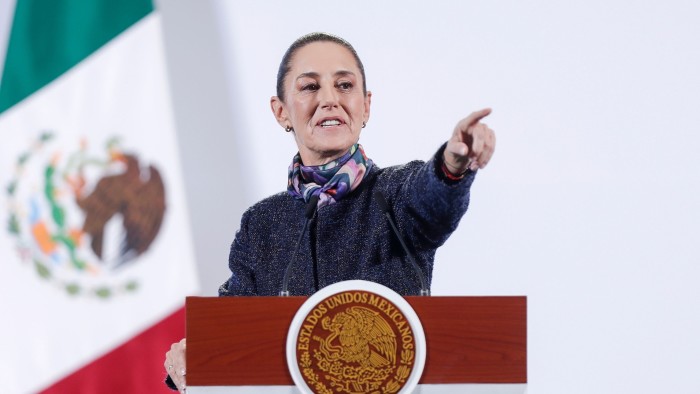Unlock the White House Watch newsletter for free
Your guide to what the 2024 US election means for Washington and the world
Donald Trump threatens Mexico’s economy with tariffs on its exports. Mexico agrees to negotiate and a deal is reached. The result? Business as usual and both sides claim a win.
That scenario played out in the first Trump administration, when the US-Canada-Mexico free trade agreement — hailed by the then-president as “the best agreement we’ve ever made” — replaced Nafta.
Optimists believe the second Trump administration will stage a repeat performance. They shrugged off last week’s vow by the president-elect to impose 25 per cent tariffs on imports from Mexico on his first day back in office. Investors are buying the positive view. After wobbling on Trump’s tariff threat, three days later the peso had recouped its losses.
“Financial markets have an almost unlimited capacity at the moment to shrug off bad news about Mexico,” said Ernesto Revilla, chief Latin America economist at Citi.
This time, though, may be different. Consider first the reasons for the tariffs. In 2018, Trump’s main complaint was that Nafta was unfair to American workers. Last week, Trump said his new tariff on Mexico and Canada would stay “until such time as Drugs, in particular Fentanyl, and all Illegal Aliens stop this Invasion of our Country”.
Joint action by the US and Mexico this year has curbed the flow of illegal migration from record levels under the Biden administration but the numbers remain high. Deaths from fentanyl, a synthetic opioid smuggled almost exclusively from Mexico, are down a little but still alarming.
Then consider the principals. Trump is more determined and more radical this time. Canada appears ready to throw Mexico under the bus if necessary. Prime Minister Justin Trudeau said that “ideally” the three legs of the North American market would be preserved but added: “Pending decisions and choices that Mexico has made, we may have to look at other options.”
Mexico has a new leader. Andrés Manuel López Obrador, the charismatic, adroit dealmaker hailed by Trump as a “fantastic guy”, has retired to his ranch. His successor Claudia Sheinbaum is a party activist and academic who does not suffer fools gladly.
Her initial response to Trump’s social media tirade — silence, followed by the reading aloud the next morning of a letter to Trump hinting at retaliation and making digs at US defence spending and illegal gun exports — did not look like a winning strategy.
Sheinbaum spoke to Trump the next day, a conversation the US president-elect hailed as “wonderful”, but they immediately disagreed over what Mexico promised. Trump claimed Sheinbaum “has agreed to stop Migration through Mexico . . . effectively closing our Southern Border”, while Sheinbaum retorted: “We reiterate that Mexico’s position is not to close borders”.
Mexico has made itself more vulnerable to US tariffs. The economy is forecast to grow just 1.4 per cent this year and is more indebted than in 2018, thanks to statist government policies that deterred foreign investment and prioritised expensive welfare programmes and white elephant infrastructure projects.
López Obrador appeased the cartels with a “hugs not bullets” strategy and fentanyl and cocaine exports flourished, drug-related murders soared and cartel control over large chunks of Mexican territory tightened.
Sheinbaum and her leftwing Morena movement have just cut the security budget by more than a third and doubled down on a radical agenda to “transform” Mexico’s institutions, scrapping independent business regulators and legislating to elect all judges via popular vote — moves that many believe contravene USMCA.
“I don’t think Sheinbaum is reading the room,” said Arturo Sarukhán, a Washington-based Mexico consultant and former ambassador. “In her public security strategy for the first 100 days, there isn’t a single mention of revamping or restarting . . . co-operation with the US.”
Eric Farnsworth, vice-president of the Council of the Americas business lobby, said investors who dismissed Trump’s latest tariff threat as a negotiating ploy should remember his first-term pledge to pull the US out of the Trans-Pacific Partnership. “He did pull out and there was no negotiation,” he said. “The threat against Mexico this time has echoes of that.”
Sheinbaum may yet reach a deal with Trump. But the risks of the US’s southern neighbour losing tariff-free access to the rest of North America are clearly rising — and if they do, one country will be ready. “China under Xi Jinping has been keen to develop relations with Mexico,” said Farnsworth.
Read the full article here

